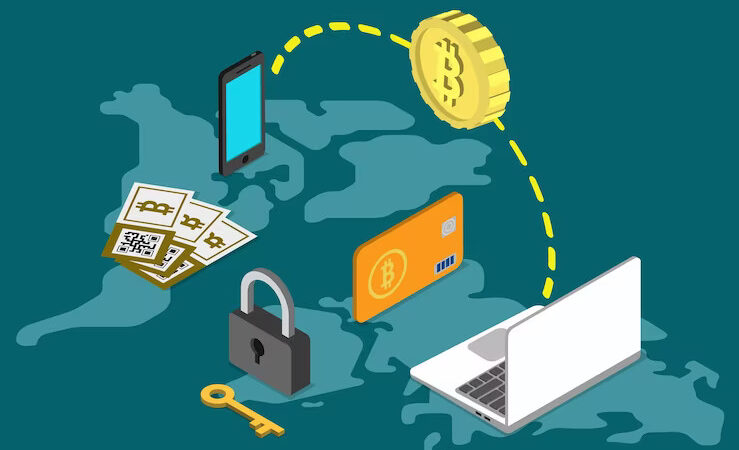Facilitating Remittance and Cross-Border Transactions with Bitcoin
- 1 Understanding Remittance and Cross-Border Transactions
- 1.1 What are Remittance and Cross-Border Transactions?
- 1.2 The Challenges of Traditional Remittance Systems
- 1.3 The Role of Financial Institutions in Cross-Border Transactions
- 2 The Emergence of Bitcoin in the Remittance Industry
- 2.1 What is Bitcoin and How Does it Work?
- 2.2 Benefits of Using Bitcoin for Remittance
- 2.3 Real-World Examples of Bitcoin Remittance Solutions
- 3 Overcoming Regulatory and Security Challenges
- 3.1 Navigating the Regulatory Landscape
- 3.2 Ensuring Security and Privacy in Bitcoin Transactions
- 3.3 Addressing Anti-Money Laundering (AML) and Know Your Customer (KYC) Requirements
- 4 Comparing Bitcoin to Other Digital Remittance Solutions
- 4.1 Traditional Money Transfer Operators (MTOs) vs. Bitcoin
- 4.2 Blockchain-Based Remittance Platforms
- 4.3 Stablecoins and Their Role in Cross-Border Transactions
- 5 Conclusion
Remittance refers to money sent by migrants to their home countries while cross-border transactions involve the movement of funds across national borders. These transactions are essential to the global economy, with the World Bank estimating that remittance flows exceeded US$550 billion in 2019. However, traditional remittance systems are often slow and expensive, with high transaction fees and lengthy processing times. This is where Bitcoin and other digital currencies come in, offering a faster, cheaper, and more borderless alternative.
Understanding Remittance and Cross-Border Transactions

What are Remittance and Cross-Border Transactions?
Remittance refers to the transfer of funds from one country to another, usually by migrants who send money to their families or friends in their home countries. Cross-border transactions encompass a broader range of transactions that involve the transfer of money or assets across national borders, including trade payments, foreign investments, and stock transfers.
The Challenges of Traditional Remittance Systems
Traditional remittance systems rely on a network of intermediaries, such as banks and money transfer operators (MTOs), to facilitate transactions. These intermediaries charge high fees, which can range from 5% to 15% of the total transaction amount, making them prohibitively expensive for many people. In addition to high fees, traditional remittance systems are also slow, with some transactions taking up to five days to complete. This can be particularly challenging for individuals who need to send money urgently.
The Role of Financial Institutions in Cross-Border Transactions
Financial institutions, including banks and other financial intermediaries, play a critical role in facilitating cross-border transactions. They provide the infrastructure necessary for transactions to take place, including payment systems, foreign exchange services, and regulatory compliance measures. However, traditional financial institutions are often restricted by national borders and regulations, leading to slow and costly cross-border transactions.
The Emergence of Bitcoin in the Remittance Industry
Immediate Connect is a game-changing platform that facilitates seamless remittance and cross-border transactions using Bitcoin. With https://immediateconnect.net/, individuals and businesses can securely transfer funds internationally, bypassing traditional banking systems and reducing transaction costs.
Leveraging the power of Bitcoin’s decentralized network, Immediate Connect offers a user-friendly interface, real-time transaction tracking, and enhanced security measures, making it a reliable choice for efficient and cost-effective cross-border payments. Experience the convenience and speed of Immediate Connect for hassle-free remittance and cross-border transactions with Bitcoin.
What is Bitcoin and How Does it Work?
Bitcoin is a decentralized digital currency that operates on a peer-to-peer network. Unlike traditional currencies, Bitcoin does not rely on intermediaries such as banks or governments to operate. Instead, it uses cryptography to verify transactions and maintain the integrity of the Bitcoin network. Transactions are recorded on a distributed ledger called the blockchain, which is transparent and secure.
Benefits of Using Bitcoin for Remittance
Bitcoin offers several benefits over traditional remittance systems. Firstly, Bitcoin transactions are faster and cheaper than traditional transactions, with fees as low as a few cents per transaction. Secondly, Bitcoin is borderless, allowing users to send and receive money from anywhere in the world. This makes it ideal for individuals who need to send money across borders quickly and at low cost. Finally, Bitcoin is secure and transparent, with transactions recorded on a public ledger that is tamper-proof.
Real-World Examples of Bitcoin Remittance Solutions
Several Bitcoin startups have emerged in recent years, offering Bitcoin-based remittance solutions. One such example is BitPesa, which operates in several African countries, including Kenya, Tanzania, and Nigeria. BitPesa enables users to send and receive Bitcoin, which can then be converted into local currency using their mobile phones. Another startup, Abra, allows users to send Bitcoin to any mobile phone number in the world, making it easy for people to send money to friends and family who may not have access to traditional banking services.
Overcoming Regulatory and Security Challenges
Navigating the Regulatory Landscape
Bitcoin and other digital currencies operate in a regulatory gray area, with different countries having different approaches to regulating them. Some countries have embraced digital currencies, while others have taken a more cautious approach. This regulatory uncertainty can make it challenging for Bitcoin-based remittance startups to operate, as they must comply with different regulations in different countries.
Ensuring Security and Privacy in Bitcoin Transactions
Bitcoin transactions are secured by cryptography, which makes them highly secure. However, there have been several high-profile security breaches, such as the Mt. Gox hack in 2014, which resulted in the loss of millions of dollars worth of Bitcoin. To ensure the security of Bitcoin transactions, it is essential to use reliable and reputable Bitcoin wallets and exchanges. Similarly, protecting the privacy of Bitcoin users is crucial, particularly in countries where digital currencies are not yet fully accepted.
Addressing Anti-Money Laundering (AML) and Know Your Customer (KYC) Requirements
Bitcoin-based remittance startups must comply with anti-money laundering (AML) and know your customer (KYC) requirements, similar to traditional financial institutions. These requirements help to prevent money laundering and terrorist financing by ensuring that the identities of users are verified and that all transactions are legitimate. However, strict AML/KYC requirements can add to the cost and complexity of Bitcoin-based remittance solutions.
Comparing Bitcoin to Other Digital Remittance Solutions
Traditional Money Transfer Operators (MTOs) vs. Bitcoin
Traditional money transfer operators (MTOs) such as Western Union and MoneyGram have dominated the remittance industry for decades. While they offer reliable and convenient services, they are also often slow and expensive. Bitcoin-based remittance solutions offer a faster and cheaper alternative, making them ideal for people who need to send money across borders quickly and at a low cost.
Blockchain-Based Remittance Platforms
Blockchain-based remittance platforms, such as Ripple, offer another alternative to traditional remittance systems. These platforms use blockchain technology to enable faster and cheaper cross-border transactions. However, unlike Bitcoin, they rely on intermediaries, such as banks, to facilitate transactions. Blockchain-based remittance platforms offer faster and cheaper transactions than traditional payment systems, but they are still slower and more expensive than Bitcoin-based remittance solutions.
Stablecoins and Their Role in Cross-Border Transactions
Stablecoins, such as Tether and USD Coin, are digital currencies that are pegged to the value of a stable asset, such as the US dollar. They offer several benefits over traditional currencies, including faster and cheaper transactions, borderless transfers, and lower transaction fees. Stablecoins are increasingly being used in cross-border transactions, particularly in countries where traditional banking services are inaccessible or unreliable. However, stablecoins are still in their early stages of development, and their long-term viability remains uncertain.
Conclusion
The emergence of Bitcoin and other digital currencies has transformed the remittance industry, offering a faster, cheaper, and more borderless alternative to traditional payment systems. However, regulatory uncertainty, security concerns, and compliance requirements continue to pose significant challenges to the adoption of Bitcoin-based remittance solutions. While other digital remittance solutions, such as blockchain-based platforms and stablecoins, offer additional alternatives, Bitcoin remains a popular choice for individuals who need to send money across borders quickly and at low cost.

















